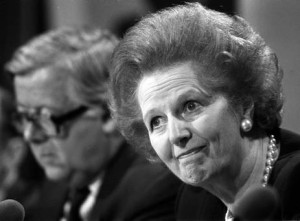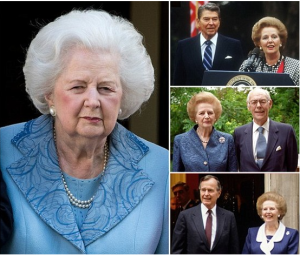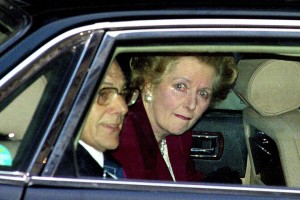In politics, if you want anything said, ask a man; if you want anything done, ask a woman.
This was how the UK Evening News quoted Margaret Thatcher, then the Conservative MP for Finchley, turning male chauvinism on its head – to the delight, no doubt, of her audience at the National Council of the Townwomen’s Guilds in London on May 20, 1965.
 It probably explains what motivated her to become the first female prime minister of the United Kingdom in 1979 – at a time when politics there was even more chauvinistic than it was in the United States.
It probably explains what motivated her to become the first female prime minister of the United Kingdom in 1979 – at a time when politics there was even more chauvinistic than it was in the United States.
It might also explain why she governed more like a mother hen in a chicken coop than a leader in a democratic country. Apropos of which, Thatcher is also credited with the following ballsy quote (unfortunately sourcing it is like sourcing an Aesop’s fable):
It may be the cock that crows, but it is the hen that lays the eggs.
But this too indicates why her legacy is littered with disaffected male colleagues who took umbrage at her predilection for pussy-whipping them into agreeing with her on everything.
This was brought into stark relief when, despite near-unanimous opposition among her cabinet ministers, she rammed a 1990 poll tax – with its reverse Robin-Hood impact – through parliament. A feat for this one-time grocer’s daughter that was as ironic as it was dubious. Unsurprisingly, the riots it incited sealed her demise.
 Incidentally, I am no psychologist, but that Thatcher appointed only one woman to a peripheral cabinet position during her three-consecutive terms as prime minister makes self-evident her preference for the very chauvinism in politics (and in everyday life) she famously ridiculed.
Incidentally, I am no psychologist, but that Thatcher appointed only one woman to a peripheral cabinet position during her three-consecutive terms as prime minister makes self-evident her preference for the very chauvinism in politics (and in everyday life) she famously ridiculed.
Yet, far from recognizing the self-hating shame inherent in this, she expressed contempt for women’s efforts to redress this chauvinism in ways that would make any male-chauvinist pig proud:
I owe nothing to Women’s Lib.
(London Telegraph quoting Thatcher, May 4, 2009)
The feminists hate me, don’t they? And I don’t blame them. For I hate feminism. It is poison.
(The Spectator, March 12, 2011)
But just imagine the condemnation and accusations of racial self-hatred if the first Black president of the United States had appointed only one Black to a peripheral position in his cabinet….
Much is being made today of the way Thatcher changed Britain by smashing the trade unions and championing free markets as the means not just to grow the economy, but to even promote morality – as current Prime Minister David Cameron, an unabashed acolyte, might say.
Never mind that government bailouts in recent years have made a complete mockery of her gospel of free markets. Or that, in The Affluent Society, John Kenneth Galbraith condemned the economic philosophy Thatcher espoused as little more than:
…a search for a superior moral justification for selfishness [and greed].
This is significant because her PR guru Lord Saatchi claims that Thatcher fancied herself, ironically enough, a follower of Galbraithian economics — with its “Great Society,” big-government focus.
Whatever the case, it is no accident that her economic policies have led inexorably to a gap between rich and poor in Britain today (as duly documented in a June 14, 2012 report by Oxfam) that has not been seen since the age of Dickens. Alas, it’s an indication of her influence as prime minister and of the long shadow she casts that when Labour Prime Minister Tony Blair had a chance to redress the demonstrable inequities “Thatcherism” produced, he chose instead to merely rebrand her policies as his own “Third Way,” which amounted to little more than synthesizing left-wing political rhetoric with right-wing economic policies. And every prime minister since Blair has done little more than marry his rhetoric with her policies.
This is why it is arguable that Thatcherism – with its focus on deregulating markets and lowering taxes while decreasing public expenditures and cutting social benefits – spawned the austerity measures that are threatening to plunge Britain into another “winter of discontent.” And, with a triple-dip recession looming, this winter of discontent could make the one Thatcher purportedly saved it from seem like a summer of wine and roses.
Britain’s economic growth has taken an unexpected knock, raising fears of a triple-dip recession.
(Channel 4 News UK, January 25, 2013)
All the same, Thatcher’s legacy is probably distinguished most by her foreign policies (her alliance with U.S. President Ronald Reagan to prolong Apartheid in South Africa being one glaring exception). For example, given the financial crises now threatening the solvency of the entire Eurozone, some might cite the “Euroscepticism” she reinvented as a highlight. I agree. Most will cite her invasion of the Falkland Islands. I disagree. For I believe her invasion of these islands was every bit as vainglorious as Reagan’s invasion of the Caribbean island of Grenada:
The Falklands are little more than a bleak and desolate cluster of rocks dotting the South Atlantic Ocean some 8,000 miles from Britain. Therefore, when British Prime Minister Margaret Thatcher dispatched the Royal Navy there in 1982 to oust Argentine forces, I thought she was acting pursuant to some quixotic, neocolonial notion of extraterritorial sovereignty.
(“Argentina vs. Britain Over Falklands … Still,” The iPINIONS Journal, February 26, 2010)
Instead, the foreign policy I would cite in this respect is her truly historic decision to “do business” with Mikhail Gorbachev.
I like Mr. Gorbachev. We can do business together.
(BBC, December 17, 1984)
For it was this decision in the first instance that led inevitably to the disintegration of the Soviet Union after Gorbachev, the reformer, became its leader in 1988.
 In fact, her policy of fighting the Cold War by constructive engagement with Gorbachev raised Britain’s stature and influence on the world stage to their highest levels in the 20th Century. Not least because this later enabled her to deftly manipulate both the cowboy president, Ronald Reagan (1980-88), and his wimpy successor, George H.W. Bush (1988-92) – rather like Iago whispering in Othello’s ear. At it turned out, no politicians were more pussy-whipped by her than these two presidents of the United States.
In fact, her policy of fighting the Cold War by constructive engagement with Gorbachev raised Britain’s stature and influence on the world stage to their highest levels in the 20th Century. Not least because this later enabled her to deftly manipulate both the cowboy president, Ronald Reagan (1980-88), and his wimpy successor, George H.W. Bush (1988-92) – rather like Iago whispering in Othello’s ear. At it turned out, no politicians were more pussy-whipped by her than these two presidents of the United States.
Which brings me back to her cabinet ministers. Because it speaks volumes that these men who knew her best were the ones who decided that, after 11 years, Thatcher had become so bad for Britain they had to mutiny against her (by mounting a parliamentary challenge to her leadership of the Conservative Party in November 1990, which resulted in John Major becoming prime minister).
Alas, so inhibiting is the maxim, “never speak ill of the dead,” that listening to reflections by former colleagues today you’d think she did not have a single critic in her Conservative Party. But because I’d rather be called insensitive than hypocritical, I shall join the still small voices of those who truly believe that nothing became her in political life quite like the way she left it:
The final victory came on Thursday 22 November as Margaret Thatcher ran crying from the steps of 10 Downing Street to a waiting car – a fitting end to an individual whose policies had caused working class people and their families to shed an ocean of tears.
(‘The Rise of the Militant’ by Peter Taafe)
 Now, lest it be mistaken for gloating, please know that this quote is intended only to convey the reassuring fact that inside that iron political armor this lady wore throughout her career was a woman of genuine human feeling … just waiting to get out.
Now, lest it be mistaken for gloating, please know that this quote is intended only to convey the reassuring fact that inside that iron political armor this lady wore throughout her career was a woman of genuine human feeling … just waiting to get out.
Baroness Thatcher lived in relative obscurity after leaving office. In rare public appearances since she suffered a stroke over a decade ago, it was painfully clear that ill health, including dementia, was melting “The Iron Lady” into a wobbly shadow of herself.
She died of another stroke yesterday. She was 87.
NOTE: I developed my political antipathy towards Thatcher as a college student in the early 1980s when she and Reagan were the Western faces of the Apartheid regime – with Thatcher earning everlasting condemnation and shame for dismissing Mandela’s liberation ANC as a “typical terrorist organization.” My campus was a hotbed of anti-Apartheid protests.
But as I read reports about people holding “death parties” to celebrate her passing, it occurred to me that if Nelson Mandela could forgive his Apartheid jailers, then Thatcher’s critics/victims should forgive her.
* This commentary was originally published yesterday, April 8, at 7:05 pm